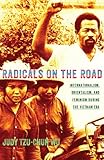Radicals on the Road : Internationalism, Orientalism, and Feminism during the Vietnam Era / Judy Tzu-Chun Wu.
Material type: TextSeries: The United States in the WorldPublisher: Ithaca, NY : Cornell University Press, [2013]Copyright date: ©2013Description: 1 online resource (352 p.) : 20 halftonesContent type:
TextSeries: The United States in the WorldPublisher: Ithaca, NY : Cornell University Press, [2013]Copyright date: ©2013Description: 1 online resource (352 p.) : 20 halftonesContent type: - 9780801446757
- 9780801468193
- Feminism -- United States -- History -- 20th century
- International travel -- Social aspects -- United States -- History -- 20th century
- Internationalism -- History -- 20th century
- Orientalism -- United States -- History -- 20th century
- Political activists -- Travel -- United States -- History -- 20th century
- Social movements -- United States -- History -- 20th century
- Vietnam War, 1961-1975 -- Protest movements
- Vietnam War, 1961-1975 -- Social aspects -- United States
- Gender Studies
- Military History
- U.S. History
- HISTORY / Military / Vietnam War
- 973.92 23
- online - DeGruyter
- Issued also in print.
| Item type | Current library | Call number | URL | Status | Notes | Barcode | |
|---|---|---|---|---|---|---|---|
 eBook
eBook
|
Biblioteca "Angelicum" Pont. Univ. S.Tommaso d'Aquino Nuvola online | online - DeGruyter (Browse shelf(Opens below)) | Online access | Not for loan (Accesso limitato) | Accesso per gli utenti autorizzati / Access for authorized users | (dgr)9780801468193 |
Frontmatter -- Contents -- Introduction -- Part I: Journeys for Peace -- Chapter 1. An African American Abroad -- Chapter 2. Afro- Asian Alliances -- Chapter 3. Searching for Home and Peace -- Part II: Journeys for Liberation -- Chapter 4. Anticitizens, Red Diaper Babies, and Model Minorities -- Chapter 5. A Revolutionary Pilgrimage -- Chapter 6. The Belly of the Beast -- Part III: Journeys for Global Sisterhood -- Chapter 7. "We Met the 'Enemy'- and They Are Our Sisters" -- Chapter 8. War at a Peace Conference -- Chapter 9. Woman Warriors -- Legacies: Journeys of Reconciliation -- Ac know ledg ments -- Notes -- Bibliography -- Index
restricted access online access with authorization star
http://purl.org/coar/access_right/c_16ec
Traveling to Hanoi during the U.S. war in Vietnam was a long and dangerous undertaking. Even though a neutral commission operated the flights, the possibility of being shot down by bombers in the air and antiaircraft guns on the ground was very real. American travelers recalled landing in blackout conditions, without lights even for the runway, and upon their arrival seeking refuge immediately in bomb shelters. Despite these dangers, they felt compelled to journey to a land at war with their own country, believing that these efforts could change the political imaginaries of other members of the American citizenry and even alter U.S. policies in Southeast Asia.In Radicals on the Road, Judy Tzu-Chun Wu tells the story of international journeys made by significant yet underrecognized historical figures such as African American leaders Robert Browne, Eldridge Cleaver, and Elaine Brown; Asian American radicals Alex Hing and Pat Sumi; Chicana activist Betita Martinez; as well as women's peace and liberation advocates Cora Weiss and Charlotte Bunch. These men and women of varying ages, races, sexual identities, class backgrounds, and religious faiths held diverse political views. Nevertheless, they all believed that the U.S. war in Vietnam was immoral and unjustified.In times of military conflict, heightened nationalism is the norm. Powerful institutions, like the government and the media, work together to promote a culture of hyperpatriotism. Some Americans, though, questioned their expected obligations and instead imagined themselves as "internationalists," as members of communities that transcended national boundaries. Their Asian political collaborators, who included Buddhist monk Thich Nhat Hanh, Foreign Minister of the Provisional Revolutionary Government Nguyen Thi Binh and the Vietnam Women's Union, cultivated relationships with U.S. travelers. These partners from the East and the West worked together to foster what Wu describes as a politically radical orientalist sensibility. By focusing on the travels of individuals who saw themselves as part of an international community of antiwar activists, Wu analyzes how actual interactions among people from several nations inspired transnational identities and multiracial coalitions and challenged the political commitments and personal relationships of individual activists.
Issued also in print.
Mode of access: Internet via World Wide Web.
In English.
Description based on online resource; title from PDF title page (publisher's Web site, viewed 02. Mrz 2022)


